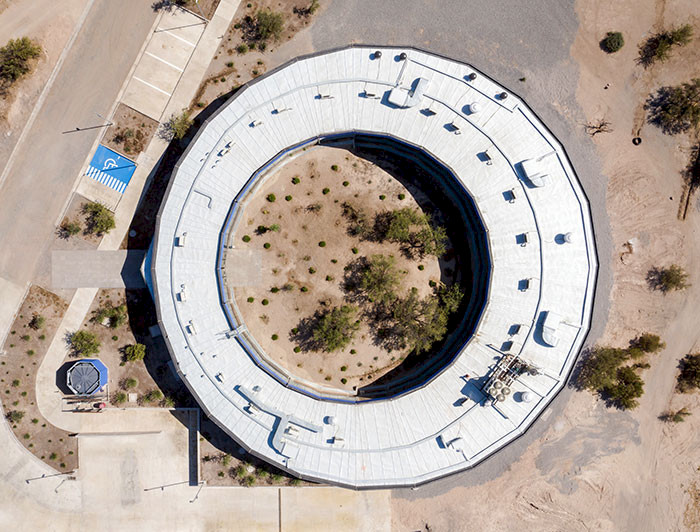
Turning Chile into a world food power
The new building of the Carén Center joins the Technological Center for Food Innovation network. The facility will allow UC Chile and the other university members to innovate in the food industry.

photo_camera Chile will become one of the world's leading producers of sphisticated and sutainable food through CAREN.
Generate an unprecedented change in the Chilean food industry.
That is the objective of the recently inaugurated Carén Center, part of the Technological Center for Food Innovation (CeTA). In 2015, they created a corporation with the support of Corfo and which is part of the roadmap of the Transforma Alimentos (Transform Food) Strategic Program.
Its members are:
- Universidad de Chile,
- Pontificia Universidad Católica de Chile,
- Universidad de Talca,
- Universidad de La Frontera,
- Fundación Chile
- Fraunhofer Chile Research.
With the mission of making Chile one of the world powers in the production of sophisticated and sustainable food, the center promotes the creation of Innovation Centers located in strategic areas of the country.
The Carén Center seeks to strengthen the central region and joins those already existing in La Araucanía (south of the country) and Coquimbo (north of the country).
As highlighted by the Minister of Economy, Lucas Palacios:
"The inauguration of this center marks a milestone, because it will improve and facilitate access to innovation, generating a space where scientists and academics will be able to work together with large companies, but also hand in hand with entrepreneurs throughout the central area, who will be able to get that push they need to turn their ideas into businesses. Today, we have consolidated a project that will strengthen the Chilean food industry. It will make it more competitive, with healthier products, and that will give a new incentive to a key industry for the future of Chile."
"Initiatives such as these allow our entrepreneurs, through innovation, to add value to their projects. Turning Chile into a world-class agri-food power, with a view to the sustainable reactivation of our economy," added CORFO's executive vice-president, Pablo Terrazas.
As highlighted by the President of Universidad Católica Ignacio Sánchez: "CeTA's work in transferring technology and new knowledge in food, relates very directly with the public commitment of the university, since we are working in various areas, such as food production, soil cultivation, nutrition, and chronic diseases.
We can be interdisciplinary and place all the research potential of the different faculties to develop an essential issue as healthy nutrition for our population."
State-of-the-Art Infrastructure and Equipment
With a state-of-the-art design, its circular shape allows a 360-degree panoramic view of the Carén Park. The center covers 1,065 m², with 544 m² for piloting and prototyping, 110 m² for process control laboratory, and 40 m² of warehouses, leaving 10% of the area for offices and meeting rooms.
According to Jaime Bellolio, UC Chile's representative on CeTA's board of directors:
"Universidad Católica has played a leading role in the Technological Center for Food Innovation (CeTA) history since its founding in 2015. Since then, intense work has been carried out with the other partners to raise this issue. The importance of innovation and technology in the food industry is installed in the public debate. We must highlight the support of the UC Chile authorities and the work of the directors who represent it on the board."
The works started in October 2019, entailed an investment of 59,000 UF (development units), which advanced quickly despite the health crisis due to the pandemic, allowing the immediate start of operations. In terms of high-standard equipment, around 400 million pesos have been invested so far.
The infrastructure is designed to allow prototyping, piloting, and scaling food innovations, with added value from raw materials and agri-food by-products.
According to Research Vice President Pedro Bouchon:
"This project was born from a diagnosis in which to produce food development at the national level, it is necessary to have infrastructure that did not exist: neither for small businessmen, medium-sized businessmen, entrepreneurs, nor for researchers who want to transform their ideas into products."
The center has state-of-the-art technological equipment, using natural colorants, raw materials, and discards. Barley from beer, to create a cereal, or grape waste (pomace) from the wine industry, to make sweet gummies. Also, a bioreactor with a capacity of 75 liters can make probiotics and prebiotics at a large scale.
Create and Test
"Here, there is an infrastructure to be able to carry out pilot trials. We offer equipment to produce food innovations that did not exist or were not available until now. Entrepreneurs and researchers will have access to sophisticated machines such as an evaporator, a dryer, an excluder, or a concentrator, " said Pedro Bouchon.
The process is from developing the product concept to creating pilots in small quantities to have a better market insertion.
"We help entrepreneurs or medium-sized companies that have an idea they want to materialize. They approach CeTA, and we work together to make that product," explained Jean-Paul Veas, executive director of CeTA.
"With this new center, CeTA has the potential to meet the demands not only of companies but also of entrepreneurial initiatives and university research projects. It will generate an unprecedented change in the innovation ecosystem in the national food industry. With the start of operations of the Carén Innovation Center, CeTA consolidates its role in the food industry, aiming to strengthen the sector as a pillar of the country's development," said Jaime Bellolio.
As professor Wendy Franco, from the Department of Chemical Engineering and Bioprocesses of the UC School of Engineering, explained:
"This is a space where it is possible to turn an idea into a prototype, into something tangible and scalable. The pilot plant is carefully designed and equipped with complementary development lines that transform raw materials into finished products, ready for commercialization. In addition to having highly trained professionals to guide the entrepreneur, businessman or academic in the best way to develop and transfer the product."
UC Chile has been developing food innovations for quite some time, and these can be enhanced with this new center.
The professor highlighted, for example, "NotCo, which is by far the most important innovation we have had at the university in the area of food. It is now a unicorn, worth more than one million dollars. It is also interesting to mention ReSoul, which is an aroma recuperator for the wine industry. Or FishExtend, which is a product made with natural ingredients that extends the shelf life of fish."
And he continued:
"Also, the formulation of edible quinoa flour coatings was industrially tested on strawberries with outstanding results. And the nano-encapsulation of bee pollen for the development of superfoods. These are just a few examples because we have many other products that are in the final stage or the development phase."
As Jaime Bellolio added:
"The pandemic has brought to the forefront the need to improve the health of the population in all areas and, in that, working actively to generate better quality food alternatives is key."
The operations of the Carén Center will begin with six lines of work, which will progressively increase to 19 by 2023.
Those making their debut at this stage are:
-
Sauces: semi-liquid or medium viscosity products from horticultural and livestock raw materials.
-
Oils: extraction and stabilization of oils from natural materials and by-products of the agro-industrial chain.
-
Extruded snacks (from compressed masses): new snack-type products, such as breakfast cereals, soufflés, among others.
-
Protein isolates: new protein isolate alternatives for new product development, following plant-based trends.
-
Ingredients and colorants: development of components and additives.
-
Fermented products: new products with fermentation processes to develop symbiotic products (prebiotics, probiotics).


